“There’s the imperative to keep secrets, and the imperative to have them known. How do you know that you’re a person, distinct from other people? By keeping certain things to yourself.”
—Jonathan Franzen, Purity
 Purity
Purity
Jonathan Franzen
![]()
People I follow on social media no longer like Jonathan Franzen. He must have said something to make them uncomfortable; I’ve seen fashionable opinion turn against other writers for similar reasons, Joyce Carol Oates for example. Sadly, along with their new-found distaste for Franzen the man, they now say he’s not a very good writer. I don’t know what he said to start all this, but I think he’s one of our very best contemporary novelists, and I love his work.
I rank Purity a half-notch below Freedom and The Corrections, both of which I raved about:
– From my review of Freedom:
The almost circular symmetry of the narrative structure, in turn, reminds me of David Mitchell’s Cloud Atlas, another novel I loved. Freedom is a big novel (576 pages) about real people living in real times. You will be frustrated with them, sometimes to the point of trying to shout at them through paper and ink because you know they are really there, separated from you only by artificial barrier of the book in your hands, and they might just hear you if you shout loud enough. You will be, along with these strong and unforgettable characters, hopeful, heartbroken, joyful, loving, angry, despairing, depressed, shocked and rocked by the world’s corruption, delighted with its beauties, and finally hopeful again. I’ll stick my neck out and say you will be . . . as I was . . . not just lifted up but exalted at the novel’s ending. This is old school writing. War and Peace old school. This is our 21st century classic.
– From my review of The Corrections:
I was reminded of Phillip Henscher’s The Northern Clemency, a big novel about ordinary people living what from a distance might look like ordinary lives, but which, viewed from from a closer vantage point, become extraordinary … and extraordinarily fascinating. Franzen, like Henscher, narrates his stories in an old-fashioned omniscient voice, getting inside his characters’ heads to reveal their innermost thoughts, fears, and motivations. In the process he creates real people … people very much like you and me, people we recognize and care about. People real enough to make us squirm in embarrassment, real enough to make us cry.
In this novel, I was never quite in sync with Pip, or Purity, the title character. What the hell is wrong with her, I kept asking … why doesn’t she do this, why doesn’t she do that, damn it Pip get your act together … as you can see, once again shouting at characters through the barrier of paper and ink! Andreas was never a sympathetic character, so I was not surprised by my distaste for him (obviously the reaction Franzen hoped to create in readers); Tom and Leila were my friends in this novel and I constantly found myself wishing them well. Anabel … a perfect and believable devil.
And it’s a hell of a story, too, with side stories (the mishandling of nuclear weapons at a military depot, for one) I wish Franzen had fleshed out, more than enough to keep me turning pages.
My one irritation with Purity is Franzen’s use of a deus ex machina, and it’s a hell of a one, a thing that simply doesn’t happen in real life, at least real life as I have experienced it. I bought the idea of Andreas unearthing the goods on Tom, Anabel, and Pip, manipulating Pip to get at Tom. It wasn’t that far-fetched, at least in the context of this novel. No, what I didn’t buy was the hellaciously large inheritance. What is this, The Princess Diaries? I thought it a lazy trick, and I’m surprised Franzen employed it.
Overall, though, this was a four-star novel, only slightly less worthy than Franzen’s previous novels, and I quite enjoyed it. There’ll be no dissing of Jonathan Franzen in my house!
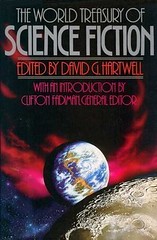 The World Treasury of Science Fiction
The World Treasury of Science Fiction
David G Hartwell, editor
![]()
I’ve read hundreds of science fiction anthologies over the years. I never expect to read more than two or three memorable stories per collection; the rest are always second-rate filler. Not this time.
I picked this anthology up at a public library sale of discontinued books, which means it’s likely out of print, and that’s too bad. It’s a 1,000-plus page collection of short stories and novellas, featuring many of the great science fiction authors and several less familiar foreign writers: Kurt Vonnegut, John Campbell, Theodore Sturgeon, J. G. Ballard, Arthur C. Clarke, Gene Wolfe, John Updike, Stanislaw Lem, Robert Heinlein, Isaac Asimov, Frederick Pohl, Ray Bradbury, Ursula Le Guin, Antony Burgess, Jorge Luis Borges, Philip K. Dick, Arkady & Boris Strugatsky. Every story is outstanding; there are no B-sides. The publisher must have paid a fortune in royalties.
I had read a few of the included stories and novellas when I was younger. I’m happy to say they stand the test of time and are still excellent. Many stories in this anthology were new to me; they too are brilliant. I was thrilled to find the collection included Gene Wolfe’s The Fifth Head of Cerberus, which I’ve been wanting to re-read for some time (it was even better than I remembered, by the way). And I must say this: damn, Theodore Sturgeon rocked!
I’m telling you, this is the best SF anthology I’ve come across. I just checked: it is, sadly, now out of print, but used and some new copies are available on Amazon. If you collect science fiction anthologies, you’ll want this one in your collection.
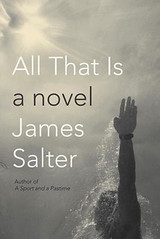 All That Is
All That Is
James Salter
![]()
Previously I had read Salter’s The Hunters and Cassada, two early novels based on his experience as a USAF fighter pilot in Korea and Germany. Reading up on Salter’s writing career, I was saddened to learn he later described these novels as youthful and not overly worthy of attention. I thought both were excellent; easily the best military flying novels I’ve read.
All That Is was Salter’s last novel, and more reflective of his later work as a novelist. I am reminded of John Updike and John Cheever, also chroniclers of modern, white, middle-class, Eastern seaboard American males in the era between 1950 and 1980. Salter writes more sparingly than Updike or Cheever, and some compare him to Hemingway in this regard, though I do not see the similarity. Salter is able to communicate much with few words, but he does not make me think of Hemingway.
Philip Bowman, the novel’s main character, muddles through. He serves in the Navy in WWII, comes home, goes to Harvard, lands an editing job with a publishing house in New York City, marries, divorces, takes a lover, moves on to another lover, finally settles down with a third. He is happy, he is sad, he earns our sympathy and concern, he moves on as one must. He commits an uncharacteristic act of revenge on a lover who betrayed him, an act foreshadowed earlier in the novel (Salter is full of such tricks, and they are part of the delight of reading him). Philip is not given to self-knowledge or grand revelations; he never changes his lifestyle or tastes. His is a simple story, wonderfully told.
Salter adopts an omniscient narrative view, sometimes disconcertingly, as when he goes into the heads of characters interacting with Philip. Rather than showing us the other people in Philip’s life and work as Philip would see them, through a fog of assumptions, misunderstandings, and incomplete knowledge, Salter will suddenly focus on this or that supporting character and reveal to us all of his or her secret fears and motivations, things only an all-seeing god … or a novelist … would know. I found it rather jarring, but after the first few instances accepted it as a narrative technique; the novel is as much about Philip Bowman’s family, friends, enemies, and lovers as it is about Philip. Philip, of course, never shares in the secrets Salter reveals to the rest of us.
I mentioned Updike and Cheever and their white middle-class male characters, and I can’t resist also mentioning Don Draper of the TV series Mad Men, because Don Draper could have stepped out from the pages of either novelist, and very much resembles Philip Bowman. They are both men of a certain class, time, and place. Some reviewers have leveled a charge of sexism against James Salter and this novel, but to my mind that’s like accusing Mad Men of sexism. It’s what the show is about; it’s what the novel is about. Yes of course it’s sexist, and so?
I love Updike, Cheever, and Jonathan Franzen (haven’t yet offered him up as a point of comparison, so I may as check that off my list now). I love their mainstream American novels. Salter was their equal, a writer’s writer.
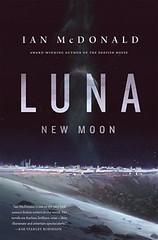 New Moon (Luna #1)
New Moon (Luna #1)
Ian McDonald
![]()
I loved McDonald’s The Dervish House and River of Gods. I didn’t get into Desolation Road and never finished it. I’d rate this one just a little below the first two, far above the last.
All four novels involve serious, detailed, visionary world-building. Honestly I don’t know now why Desolation Road didn’t grab me like the others. It’s still on my Kindle, and maybe I’ll give it another go. But on to New Moon.
The world McDonald builds here is an industrial moon, inhabited by a million or so strivers, a cutthroat society with few laws beyond a basic rule, which is that everything is a commodity which much be paid for: oxygen, water, food, protection from the fatal outside. Ayn Rand goes to the moon.
McDonald’s worlds are social, financial, cultural, and physical. You know he’s done a thorough job when you can imagine yourself living in one. I could see myself making it on his moon, right up until I began to slow down from age, at which point I’d be chucked out an airlock onto the surface, where I’d instantly die. His lunarians, a colorful lot, have built an almost feudal society, dominated by five families, or dragons, but the dragons are always feuding and catastrophe looms.
I don’t want to give anything away, but things do come to a head here, and it is an exciting and satisfying read. Still, there’s a rest of the story, which for now remains untold. I understand McDonald plans a second book in this series; when it comes out I’ll definitely read it.
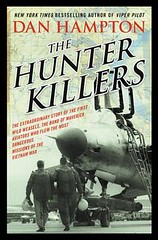 The Hunter Killers: The Extraordinary Story of the First Wild Weasels, the Band of Maverick Aviators Who Flew the Most Dangerous Missions of the Vietnam War
The Hunter Killers: The Extraordinary Story of the First Wild Weasels, the Band of Maverick Aviators Who Flew the Most Dangerous Missions of the Vietnam War
Dan Hampton
![]()
I borrowed this book from a friend and read it over the course of a few weeks. I’m a volunteer docent at a large air museum, where I talk about fighters and other aircraft to visitors from around the world. I’m slowly building up my base of knowledge on WWII, the Korean War, and Vietnam, since those are the conflicts many of our museum aircraft flew in. Because of my interest in the Vietnam air war and the Wild Weasel mission in particular, I was eager to read Hampton’s book.
I learned a lot, particularly about the early days of the air war in Vietnam, where we were caught flat-footed by North Vietnam’s introduction of surface-to-air missiles, and the rapid catch-up response by the USAF and other services, leading to the development of hunter-killer teams and eventually to the Wild Weasel program. I always knew it was a dangerous mission; I now know it was far more dangerous than I had thought, with loss rates approaching 50% in the early years.
Dan Hampton is at his best when reconstructing individual SAM suppression flights into hostile territory. He brings life to the pilots and weapon systems operators who went looking for SA-2 sites in their F-100s, F-105s, and F-4s, and those parts of the book are exciting reads. Also interesting, and well told, are his explanations of the route packs, tanker tracks, airborne command & control assets and how they worked, and the integration of SAM suppression missions into the larger air war.
Large sections of the book, however, are given over to dry Wikipedia-style explanations of the Vietnam war itself, focusing on high-level political and military decision-making at home, and these parts of the book are slow going. I perked up when Hampton slammed Strategic Air Command leadership and planning while describing the stupidly-conducted Linebacker II B-52 attacks on Hanoi during the last weeks of the war, but otherwise a lot of the background information seemed not only unessential to the story Hampton was trying to tell, but had the effect of detracting from it.
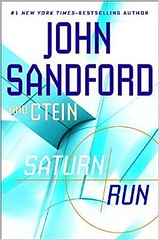 Saturn Run
Saturn Run
John Sandford, Ctein
![]()
A fair stab at mass-market science fiction by an author who normally writes mass-market thrillers (that would be John Sandford … I have no idea what this “Ctein” character contributed to the novel). Saturn Run was a good enough story to keep me turning pages, but I wouldn’t call it good science fiction: the characters are thin, the plot predictable from the beginning, the alien encounter as awe-inspiring as a trip to Ikea (which is pretty much what it amounts to) … the sense of mystery, wonder, and uncanny otherness I look for in first-encounter stories was entirely absent. Competent but not the kind of SF I care to read.
Great reviews, I’m especially thankful for the Sandford review as I’m a great fan of his Lucas Davenport Prey series and his Virgil Flowers series. Under his real name he’s a Pulitzer winning journalist.
Yeah, I don’t think he’s written any other science fiction. I’d probably like his regular stuff more.